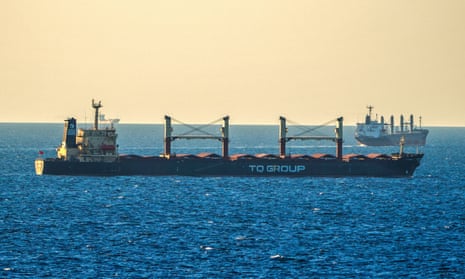Egypt’s leader, Abdel Fatah al-Sisi, has urged Vladimir Putin to return to the Black Sea grain deal during a Russia-Africa summit in St Petersburg marked by concerns about the global economic fallout from the Kremlin’s invasion of Ukraine.
In a speech during a plenary session of African delegations attended by the Russian president, al-Sisi said it was “essential to reach agreement” on reviving the deal, which had allowed 33m tons of Ukrainian grain to reach markets, many in developing countries in Africa.
Moscow said it had quit the deal because its own agricultural exports were still being blocked. But a number of African countries, including Kenya and Egypt, a key importer of Russian grain enduring an acute food crisis, have struck out angrily at Russia as the Kremlin seeks them as allies in its standoff with the west.
Kenya’s leading diplomatic official had called Russia’s exit from the deal a “stab in the back”.
According to a government transcript, al-Sisi said: “I emphasise the importance of finding urgent solutions to provide food and fertilisers at prices that help Africa overcome this crisis.
“I look forward to reaching a consensus on a grain export agreement that takes into account the demands and interests of all parties involved and puts an end to the continuous increase in grain prices.”
Egypt is the world’s largest grain importer, of which about 80% comes from Russia and Ukraine.
Video released by Russian media on Thursday showed Putin being forced to wait for al-Sisi to attend a bilateral meeting. Egypt had previously said it disagreed with Russia’s exit from the deal and said it would continue to purchase Ukrainian grain via Europe.
Putin had promised on Thursday to send free grain to six African nations in what he called a humanitarian effort. Egypt was not among those countries, which were Burkina Faso, Central African Republic, Eritrea, Mali, Somalia and Zimbabwe.
All are considered Russian allies except for Somalia, which is enduring a humanitarian crisis.
Putin on Friday also sought to placate African leaders who have called for peace talks to end the war in Ukraine. He responded coolly last month to a peace plan presented by leaders led by South Africa’s president, Cyril Ramaphosa.
The head of the 55-nation African Union said that the problem of grain and fertiliser “concerns everyone” and that, as long as a peace deal is not reached, the group would push for a return to the Black Sea grain deal.
“We will talk about this in St Petersburg, we will discuss it with Putin to see how we can restart this agreement,” Comoros’s president, Azali Assoumani, who heads the African Union, told Russian state-owned RIA Novosti.
On Friday, the president of Congo-Brazzaville, Denis Sassou Nguesso, said during the plenary session that potential peace talks “must not be underestimated”.
Putin said: “We treat your initiatives with respect and are considering them closely.” Of talks over the Ukraine crisis, he added: “This is an acute problem, and we’re not evading consideration of it.”
The Kremlin has said Putin would discuss the war in Ukraine with African leaders at a working dinner on Friday.
African leaders do not have much leverage with the Kremlin to halt the conflict, which has led to soaring grain and fuel prices that have disproportionately affected their countries’ economies.
Some spoke out in support of the Russian military on Friday. Putin applauded a speech by Ibrahim Traoré, the interim leader of Burkina Faso, who led a coup last year, which ended with the words “fatherland or death”.
A final statement endorsed by members of the summit included a call to oppose “aggressive nationalism, neo-Nazism and neo-fascism, Afrophobia, Russophobia”. Some of those terms have been used by the Kremlin to justify its invasion of Ukraine.
It also endorsed a “completion of the process of the decolonisation of Africa” and called for reparations for African states “as a result of colonial policies”, including the return of “cultural artefacts taken away in the process of colonial plunder”.
The UN-brokered grain deal was struck in 2022 and allowed cargo ships to carry grain from Ukrainian ports through a corridor in the Black Sea to world markets.
Since exiting the deal, Russia has bombarded Ukrainian ports and targeted grain infrastructure in Odesa and other cities near the Black Sea and Danube River.
On Friday, Russia said it had shot down several Ukrainian missiles near cities in the Rostov region along the Black Sea. At least 15 people were reported injured when a section of a rocket landed near a cafe in the city of Taganrog, Rostov officials said.
